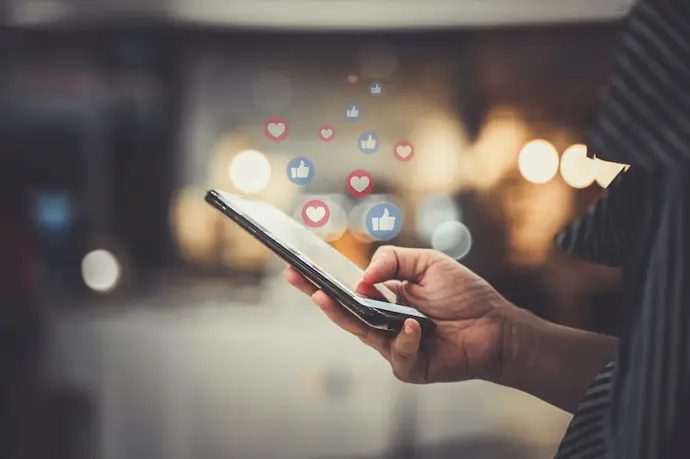If you own a small business, you probably know how useful social media can be in building your brand.
Social media is a vast and effective space where small businesses can connect with users and share content that helps them stay connected with customers.
However, as the internet has grown more pervasive in our society the legal guidelines for copyright laws and content ownership online has also become more complex.
As a business owner, you must have a clear understanding of copyright law with respect to social media so you can effectively market your business online.
In this article, we'll cover the basics of how small businesses can avoid copyright infringement when posting on social media.
Note, however, that claims of copyright infringement often depend heavily on the facts of the matter, so you'll want to discuss your case with an attorney if you're planning to fight claims of copyright infringement.
What is a Copyright?
Copyright law protects certain forms of creative expression (such as songs or paintings) from being reproduced or otherwise copied in ways that infringe on the intellectual property rights of the original creator.
Or, as defined by the U.S. Copyright Office:
Copyright is a form of protection grounded in the U.S. Constitution and granted by law for original works of authorship fixed in a tangible medium of expression. Copyright covers both published and unpublished works.
Copyright in General
Put another way, having the “copy rights” to a particular creative work means that you hold several exclusive rights over the work.
These rights include, but are not limited to, the right to:
- Reproduce the work in copies or phonorecords.
- Prepare derivative works based on the work. Note that a derivative work is not an exact copy. It is a creation based on the existing copyrighted work, such as translations, adaptations, and reproductions of the work in different formats. For example, a copyright holder is the only person who has the right to make a movie from their copyrighted book or authorize someone else to do so.
- Distribute copies or phonorecords of the copyrighted work to the public by sale or other transfer of ownership, or by rental, lease, or lending.
- In the case of literary, musical, dramatic and choreographic works, pantomimes, and motion pictures and other audiovisual works, to perform the copyrighted work publicly.
- In the case of literary, musical, dramatic, and choreographic works, pantomimes, and pictorial, graphic, or sculptural works, including the individual images of a motion picture or other audiovisual work, to display the copyrighted work publicly.
- In the case of sound recordings, to perform the copyrighted work publicly by means of a digital audio transmission.
If someone uses your work in any of these ways without your explicit permission (or a legal defense such as fair use), they’ve infringed your copyright rights.
What is Copyright Infringement (in General)?
In the event that another party performs any of the above-listed actions without first asking for permission (or orienting their use in the contexts of fair use), they have committed copyright infringement.
For example, let's say you take a photograph of a cool building in your city and then post that picture online.
Then, someone decides to take your photo and print it onto various mugs and shirts so they can make some quick money on the side.
In this situation, this individual would have committed copyright infringement by directly stealing your work for financial gain.
What Counts as Copyright Infringement on Social Media?
Generally speaking, anything that counts as copyright infringement in the real world (as described above) will also count as copyright infringement in digital spaces such as social media.
While websites such as Facebook or Twitter may allow you to post such content—usually due to their inability to scan each and every new post for copyrighted material—using other people's content without their permission is still generally against both the law and the terms of service for the platform in question.
Put another way, while social media sites won't usually proactively seek out and ban copyrighted material, they generally include some feature that allows other people to report any instances of copyright infringement they find.
Pay Attention to the Terms of Service and Fair Use Guidelines on Social Media
Note, however, that there is one large exception to these rules.
Specifically, by posting to a social media platform such as YouTube or Twitter, you must agree to the site’s terms of use, which often gives the site a license to use your work in various ways.
For example, most social media sites include language along the lines of "anything you post on our site can be used anywhere else on our site to improve our product's functionality or appeal."
For example, if you post a Youtube video to your personal channel, Youtube may show that video in other people's recommended feeds or on their homepage as promotional material for the site.
Note that even if a social media’s terms of service allow you to share work within its platform, it may not allow you to share the work anywhere else on the internet.
As you might expect, there are limitations to this use, however.
Usually, the terms of service create a license from the artist to the platform, and therefore, third-party guests of the website do not share the same license.
In other words, simply because it's on the Internet or because someone else has a license does not mean you have a license to use the content.
As a brand or business owner, you may not post others’ work without proper attribution and permission, even if you're posting it on the same site you found it on.
In order to thoroughly understand how you may use another individual’s work on your business’s social media feed, make sure you read through the norms on ownership rights in all your social media profiles.
Each social media channel will have its terms of service that you must abide by.
In the Twitter terms of service, for example, you can find several key sections related to this topic:
You are responsible for your use of the Services ("Twitter") and for any Content you provide, including compliance with applicable laws, rules, and regulations...We reserve the right to remove Content that violates the User Agreement, including, for example, copyright or trademark violations or other intellectual property misappropriation, impersonation, unlawful conduct, or harassment.
Twitter Terms of Service: 3. Content on the Services
As you can see, Twitter specifically notes that by using their app you must comply with all applicable IP laws, and they reserve the right to remove your business's content if you infringe on another individual's intellectual property rights.
How to Avoid Copyright Infringement on Social Media as a Small Business
Put simply, the easiest way to avoid copyright infringement on social media is to not post content owned by other people.
While this may sound simple at first, in practice it can get a little more complicated.
For example, some business owners assume that they can post artwork owned by other people as long as they credit the original artist.
However, attribution does not remove copyright infringement liability.
Instead, posting such content can often stray into a legal grey area, especially if the post associates the artwork with your business's brand or products.
As such, businesses who carelessly post content on social media are increasingly vulnerable to becoming liable of copyright infringement.
Before you post any content on social media, you must always consider whether the material you're posting is (1) wholly original work done or created by you, or (2) content that you have the legal right to post and distribute (as described in the sections below).
Additionally, you should acquaint yourself with the particular social media site's terms of service and fair use guidelines.
1. Ask for Permission
Often, the best way to avoid copyright infringement on social media is to ask the original creator if it's alright for you to post their content.
This is especially relevant for businesses who post content from smaller or local artists where you can easily get in contact with the original creator.
Additionally, make sure to keep records of any permission you receive.
This way, you have records that show that you did receive permission to post the copyright owner’s work, in case there are problems later on.
If there are multiple copyright holders, then you must ask them all for permission.
2. Use Royalty-Free Images
Royalty-free means that there is a valid copyright assumed to be in effect, but the owner has chosen to not pursue royalties.
Some people refer to this as "copyright-free," but the copyright still exists. The owner chooses not to enforce their rights to seek revenue.
There are images from sites which have no copyright restrictions.
Using these images for free on your social media platforms is an easy way to avoid potential copyright issues.
Websites such as Pixabay, Wikimedia Commons, and Creative Commons offer such royalty-free images. They offer a variety of images on numerous topics.
You can use these images for your business’s or brand’s content creation purposes.
3. Proper Licensing for a Business's Branding Materials
If you want access to images or music that you can share without concern, consider buying them through a stock photo or music service.
With the proper licensing for branding materials, you can be sure to avoid any potential copyright infringement.
There are various sites where you can perchance content for a decent price. Some websites where you can buy images for use include Shutterstock, Bigstock, and iStock.
You should make sure to read the terms and conditions of the stock site you’re using.
With that in mind, you should only use images that you’ve received permission from the copyright holder to use. You can receive permission either directly or through a license such as Creative Commons.
For example, if you find a stock image on Google images that you were about to purchase from iStock, you still may not upload the free image from Google to your feed.
In order to abide by the copyright regulations, you must use the payed version.
Conclusion
Small business owners are increasingly using social media as a means to build their brand.
However, you should be careful when posting content to social media, especially if that content includes assets that were created by other people.
Carelessly posting content you don't own to your social media page could result in claims of copyright infringement, which could lead to the removal of your content or, worse, action being taken against your page by the social media site.
If you have any questions about copyright infringement or how you can protect your business and brand on social media you should speak with an attorney about your case.
Other Resources
- "Copyright in General" U.S. Copyright Office — A short FAQ page by the Copyright Office that answers many of the most commonly asked questions about copyright law.



